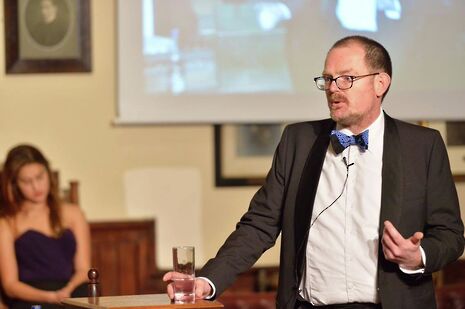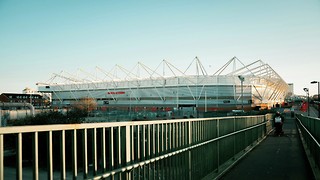Richard Spencer: “ISIS is a crisis that directly affects us”
Katie Wetherall speaks to The Telegraph’s Middle East Correspondent about Syria, terrorism, and the ‘drama’ of journalism

“My colleagues have had their heads cut off” Richard Spencer remarks, on finding himself reporting on the Syrian crisis from the sidelines, watching the country he was once able to work and travel in be decimated by a deadly civil war that shows no signs of abating. As a Middle East Correspondent for The Telegraph, Spencer writes about the latest public execution or hospital bombed. I spoke to him following from a Union debate on the media’s reporting of humanitarian crises.
The answer to my first question, of what the biggest challenge of his work is, came instantaneously: “safety: one, two and three. Simple as that. I cannot go to Northern Syria anymore. We [including Cambridge students] should all be worried about ISIS. It is a huge crisis, one that affect us directly. They provide a challenge to our society, British society, to the societies we live in.” In the last year, ISIS have claimed responsibility or thought to have been involved in over 60 major attacks in 20 countries: Paris, Beirut, Benghazi, California, Jakarta, the list goes on and on. “ISIS are like communism, not because the principles are the same, but because they are a deliberately transnational organisation offering a transnational ideology”. And the reason why ISIS is a threat to Britain? They “can get recruits anywhere – change societies from within.”
The effect? “ISIS can change how societies behave - we are already changing our society in response to the threat of very violent terrorism.” No doubt Spencer could be referring to France’s mass step of air strikes against ISIS, the continued state of emergency, and increased powers of security since the Paris attacks in November 2015. ISIS is not a “conflict happening in another part of the world, it’s an ideological war happening against us, involving us.”
I asked Spencer’s opinion on a YouGov poll last autumn, showing that 67 per cent of the British public would prefer keeping a Russia backed President Assad in power if it meant defeating the so-called Islamic State militants. He paused and considered the issue thoughtfully. “If supporting Russia and Assad ended the ISIS threat it would be in Britain’s self interest to do so – the threat from ISIS is greater than the threat from either Assad or Russia .”
It’s clear talking to Spencer that trying to pinpoint the good and bad guys impossible: “ISIS grew in the pre 2011 days precisely because of Assad and Syrian military intelligence– and most people don’t know this.” In any case, Spencer argues the idea of a Russia backed Assad is “a question of ‘if’. A big ‘if’. Russia and Assad won’t defeat ISIS. Most of the fighting and bombing by Assad and Russia against other rebels… has caused ISIS to advance. So that is not an option.”
Spencer is also constantly aware of how his coverage of the violence of ISIS terrorists could possibly contribute to prejudice against refugees and Muslims in the UK: ”My primary engagement is always with the reader, not the source material … I’m always thinking about how ‘Mrs. Smith’ in Chipping Sodbury is relating to what I write.”
In addition to factual reporting, he does however have to “sustain a narrative, one that people relate to, can accept or reject.” He contends that there is “inherent drama in writing journalism”, particularly from places like Syria, and as such “I do worry sometimes about being used as propaganda. We take editorial decisions all the time: Do we share this image? Do we use this format?” His writing, he says, “is as much an ethical decision as it is a political one.”
Spencer’s work covers the severest of human tragedy and horror, and with it he notes that “ISIS is a crisis that directly affects us.” Though to the over 250,000 Syrians killed and 11 million forced to flee their homes since 2011, the crisis is, of course, much more real.
 Features / Beyond the porters’ lodge: is life better outside college?24 February 2026
Features / Beyond the porters’ lodge: is life better outside college?24 February 2026 News / Cambridge academics sign open letter criticising research funding changes22 February 2026
News / Cambridge academics sign open letter criticising research funding changes22 February 2026 Theatre / Footlights Spring Revue? Don’t Mind if I Do!25 February 2026
Theatre / Footlights Spring Revue? Don’t Mind if I Do!25 February 2026 Fashion / The evolution of the academic gown24 February 2026
Fashion / The evolution of the academic gown24 February 2026 News / Student and union protesters hold ‘Trans Liberation Solidarity Rally’ 24 February 2026
News / Student and union protesters hold ‘Trans Liberation Solidarity Rally’ 24 February 2026







![How to Create an Attractive Freelancer Portfolio [5 Tips & Examples]](https://www.varsity.co.uk/images/dyn/ecms/320/180/2026/02/vitaly-gariev-ho2tNOWZYXM-unsplash-scaled.jpg)

